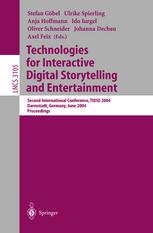

Most ebook files are in PDF format, so you can easily read them using various software such as Foxit Reader or directly on the Google Chrome browser.
Some ebook files are released by publishers in other formats such as .awz, .mobi, .epub, .fb2, etc. You may need to install specific software to read these formats on mobile/PC, such as Calibre.
Please read the tutorial at this link: https://ebookbell.com/faq
We offer FREE conversion to the popular formats you request; however, this may take some time. Therefore, right after payment, please email us, and we will try to provide the service as quickly as possible.
For some exceptional file formats or broken links (if any), please refrain from opening any disputes. Instead, email us first, and we will try to assist within a maximum of 6 hours.
EbookBell Team

4.3
88 reviewsInteractive Digital Storytelling has evolved as a prospering research topic banding together formerly disjointed disciplines stemming from the arts and humanities as well as computer science. It’s tied up with the notion of storytelling as an effective means for the communication of knowledge and social values since the existence of humankind. It also builds a bridge between current academic trends investigating and formalizing computer games, and developments towards the experience-based design of human-media interaction in general. In Darmstadt, a first national workshop on Digital Storytelling was organized by ZGDV e.V. in 2000, which at that time gave an impression about the breadth of this new research field for computer graphics (DISTEL 2000). An international follow-up was planned: the 1st International Conference on Technologies for Interactive Digital Storytelling and Entertainment (TIDSE 2003). Taking place in March 2003, it showed a more focussed range of research specifically on concepts and first pro- types for automated storytelling and autonomous characters, including modelling of emotions and the user experience. At TIDSE 2004, an established and still-growing community of researchers ga- ered together to exchange results and visions. This confirms the construction of a series of European conferences on the topic – together with the International Conf- ence on Virtual Storytelling, ICVS (conducted in 2001 and 2003 in France) – which will be further cultivated.